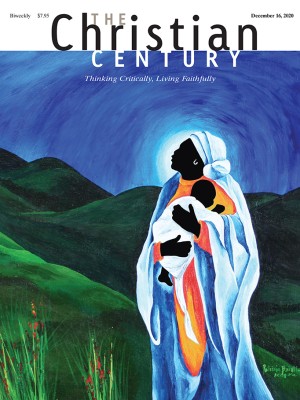December 24/25, Nativity (Isaiah 9:2-7; John 1:1-14)
The prophetic power of a candle in the window
One November night on a cross-country drive, I fell in love with the tradition of setting candles in windows. The sun went down before 5 p.m., and as we drove along the narrow, winding roads through eastern Ohio, the dark hills were lit by a surprising number of such candles, winking warmly at strangers and passersby along the way. I never forgot that feeling of welcome and glowing hope at such a dark time of year, in a place I didn’t know, and I have been a devoted user of window candles ever since.
So devoted, in fact, that when my husband and I replaced the old knob-and-tube wiring in our last house, we made sure to install an outlet under each window that looks out on the street. (In cold climates, batteries in window candles go dead faster than you can blink.) The house was a brick colonial on a corner lot, perfect for window candles: two stories with two matching windows on each of them. Instagram gold, especially after a snowfall.
Read our latest issue or browse back issues.
Legend traces the tradition back to Mary and Joseph searching for a place to stay, as well as to the star that leads the Magi on a long journey through strange country. I don’t know about you, but it’s hard not to feel as though I am also journeying through strange country, every single day. Perhaps feeling the same way, many folks in my social media feed have talked about putting up their Christmas decorations earlier than usual. My cousin in Dallas put the lights up on her family’s house on October 7 this year. They are a bulwark against the gloom, whether it’s the shorter days, the chaos of the news, or the loneliness of ongoing social distancing. This year, decorations feel like an act of resistance.
Gloom is not foreign to the nativity story. Scripture tells us Jesus’ birth was a time not only of joy and welcome but of fear, violence, and catastrophe. We tend not to focus on those bits as we hear the story read in church or watch the kids’ pageant. “No room at the inn” is often played as comedy rather than as a stomach-churning situation for a pregnant mother and a father. We dodge the presence of Augustus Caesar, the emperor looming in the background, or his ruthlessness and absolute power over the Roman Empire and its people. We brush by King Herod, his threats, the massacre of the Holy Innocents, and the flight to Egypt.
This year, however, all these grim and terrible plot turns are what get my attention. They sound less like the plot of a fairy tale, or a news report from another country, or what we used to call a “biblical” scenario (read fantastically unrealistic), and more like current and near-possible events. And somehow, for me, this is heartening—because I need even more to know that Jesus is with us, that these sorts of events are not shocking to God, as so much that seemed unbreakable has broken apart in my country.
The tradition of window candles reminds me of the old proverb, “It is better to light a candle than to curse the darkness.” I think of the service of Easter Vigil in my tradition and others, where a candle is brought into a dark church. Three times a deacon chants, “The light of Christ!” and three times the congregation chants in response, “Thanks be to God!” And I think, of course, of our Christmas readings from Isaiah 9 (“The people who walked in darkness have seen a great light”) and John 1 (“What has come into being in him was life, and the life was the light of all people. The light shines in the darkness, and the darkness did not overcome it”).
Setting out lights this year, for me, is proclaiming the power and love of Christ, which I am trying so hard to continue to put my trust in. I want to feel hope. Not in the sense of having a good attitude or looking on the bright side, but hope as holding fast to the deep-down belief that God’s love is stronger than evil, violence, and death. Hope is also an action verb. As Austin Channing Brown put it last summer on Twitter, “Black folks connect hope to duty, legacy, the good fight. . . . The freedom movement can’t survive on optimism; there’s too much to mourn.”
So I’ll light a candle instead of cursing the darkness, but that’s not all I’ll do. Window candles do not change policy, rebuild government, feed the hungry, or protect the vulnerable. But symbols and decorations have power nonetheless. They can be prophetic—tokens of resistance, inspiration to keep on keeping on, and a shield against despair.
We ended up moving this year, so we sold the house with its perfect rows of windows and conveniently located electrical outlets. Our new house is a ranch, with an asymmetrical assortment of small, medium, and picture windows, and there aren’t enough outlets. I’m sure we’ll figure it out, with the grace of God and a few extension cords. The light shines in the darkness, and the darkness cannot overcome it.





